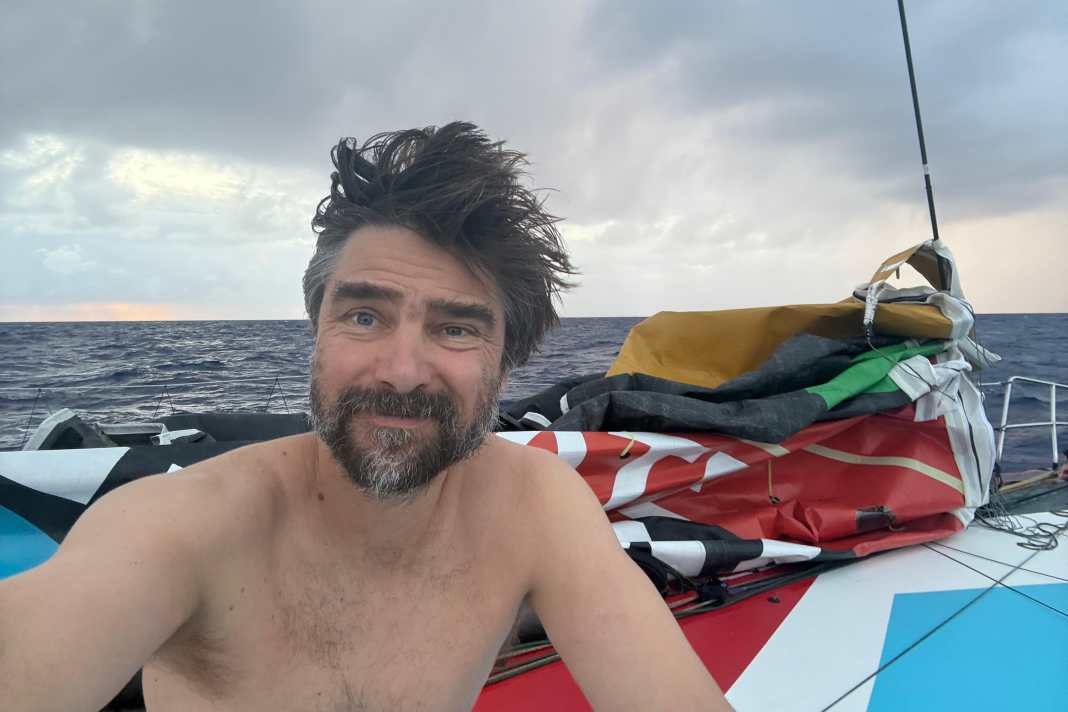Vendée Globe: Foresail lost - Boris Herrmann's series of misfortunes continues
Max Gasser
· 10.01.2025






This morning, German ocean sailor Boris Herrmann had to report another serious setback. In the Vendée Globe, currently in sixth place, the halyard latch of his J2 broke. "I slept well and woke up because I heard a fluttering noise. And sure enough, the latch of the J2 had broken. That's why it had slipped a bit down the forestay," says Herrmann.
The foresail, which measures around 95 to 100 square metres, can be sailed in a variety of configurations and on different courses and is therefore considered an almost indispensable working jib. On the remaining stretch to Les Sables-d'Olonne, the cloth is also very important for the skippers. Normally, however, this foresail always stays up and supports the mast. If there is a problem with the J2, repairs are often difficult or, in the worst case, the damage can be very serious. With his latch lock system, Boris Herrmann wanted to be able to lower the sail for safety or repairs. However, it is precisely this part that is now the cause of the devastating problem. "I actually wanted this for safety reasons, in case the sail breaks. Ultimately, it's my responsibility to be in this situation."
The loss is likely to significantly impair his competitiveness over the remaining 4,000 nautical miles. "If the Vendée Globe was easy, a lot of people would do it," said the hard-hit skipper. "I'd lose miles and probably slip down the rankings," he continued. This would put an early end to the exciting battle for fourth place for the 43-year-old. He himself now estimates that he will be 30 to 40 per cent slower and may drop back to 10th place if he is unable to repair the sail.
Boris Herrmann badly shaken, Yoann Richomme also loses sails
To do this, Herrmann would need calmer seas to climb the mast again. A daunting task for the German with a fear of heights, especially after the recent mast repair and the lightning strike this week. In close contact with his team, who can help with technical problems from land, he is trying to stay positive and work out a solution. Currently, the damaged sail is lashed to the deck and he is using the smaller J3 headsail.
Meanwhile, an exciting duel at the front of the field could also be marred by sail damage. Second-placed Yoann Richomme also reported the loss of a headsail this morning due to a broken halyard latch. From now on, the Frenchman will have to do without the big J0, which he spent 4o minutes getting back on deck after it fell into the water.
Vendée Globe: Charlie Dalin continues on historic record course
This undoubtedly plays into the hands of Charlie Dalin, who is 200 miles ahead of him in the lead, even if the impact of the mishap is unlikely to be as great as for Boris Herrmann. Richomme, like Dalin, is still expected in Les Sables d'Olonne on Tuesday. The new record, which at the beginning of the 10th Vendée Globe was thought to be almost impossible, is now becoming more tangible from day to day. Only around 1,500 nautical miles separate the "Macif Santé Prévoyance" skipper from a historic triumph. If current calculations are correct, he would beat Armel Le Cléac'h's existing best time from 2016/17 by almost ten days. Instead of 74 days, 3 hours, 35 minutes and 46 seconds, Dalin could reach the finish after just 65 days.
Before that, however, he has to continue the race, which is increasingly taking its toll on the boats and skippers, safely and without damage. Further back in the fleet, Samantha Davies, for example, reports on her boat creaking and groaning in rough seas. "I have almost 20 knots of wind, but the swell is terrible, so bad that I can't go any faster," says the Brit. All the blocks of her mainsheet system are completely destroyed, and the balls of the ball bearings have already completely disintegrated.
Mettraux, Crémer and Davies also fighting for the record
Meanwhile, she herself is still in very good shape: "I still feel in good shape and have the feeling that I can make it all the way back to Les Sables d'Olonne," said the "Initiatives-Cœur" skipper, currently in 13th position. She is simply happy and glad to still be in the race. Due to keel damage, she had to finish the previous 2020/21 edition out of competition after repairs on land, and in 2012/13 she had to retire after breaking her mast.
Just over 300 nautical miles ahead of her, Justine Mettraux is currently in tenth place. The Swiss woman is currently on course to set the record for the fastest time by a woman in the history of the round-the-world regatta. Clarisse Crémer only broke Ellen Mac Arthur's previous 20-year record (94 days, 4 hours) in 2020/21. It took 87 days, 2 hours and 24 minutes for the woman who sailed before the current Vendée Skipper booted out by sponsor Banque Populaire back then. Now we can expect the time to be up to twelve days faster.

